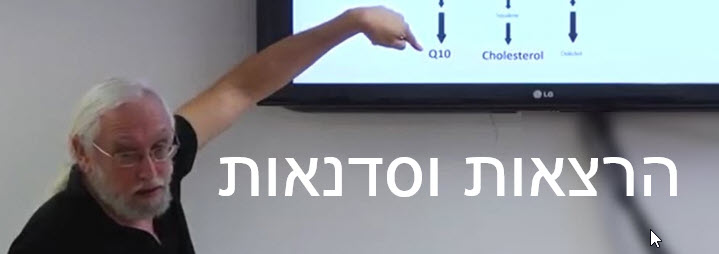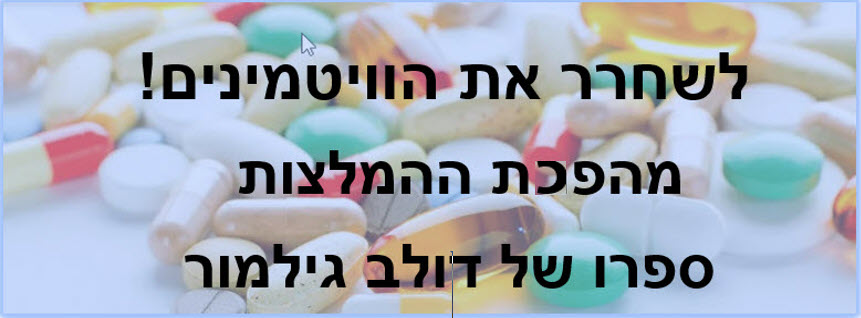אנא הפנימו וזכרו את העצה הבאה. זוהי עצה מצילת חיים.
בימים שלפני ואחרי כל ניתוח או פציעה חמורה, יש ליטול כמות נאותה של ויטמין C.
מן הסתם, חשבתם מיד שאיני מדייק בדבריי, כי אין התראה לפני פציעה פתאומית. ובכן, נזכרתי באמירתו של רבי אליעזר בפרקי אבות: "ושוב יום אחד לפני מיתתך", ושם שואלים: "וכי אדם יודע איזהויוםימות? אמר להן: וכל שכן, ישוב היום שמא ימות למחר, ונמצא כל ימיו בתשובה". לכן אני אומר, שהיות שאיננו יודעים מתי, חלילה, ניפצע, ראוי שניטול ויטמין C, לפחות בכמות של 1000 מ"ג פעמיים ביום.*
כל ניתוח נושא בחובו סיכונים שונים, וביניהם:
- האפשרות שהפציעה לא תתאחה כראוי, ו-
- סכנה לסבול מספסיס, או בעברית, אלח דם, שהוא מצב רפואי מסכן חיים, הנגרם כתוצאה מתגובה חיסונית לזיהום.
איחוי פצע
כולנו שמענו על מחלת הצפדינה, שתקפה בעיקר אנשים שירדו לים למשך חודשיים או יותר ולא יכלו לצרוך מזון טרי המכיל ויטמין C. סימפטומי המחלה הרבים היו התוצאה של פירוק רקמות החיבור בגוף: התרככות החניכיים עד כדי נשירת השיניים, שטפי דם פנימיים ועוד.
- אנטומיה בסיסית ידועה: רקמות החיבור בגוף אינן מתפרקות, רק בזכות סיבי החלבון, קולגן, שמחזקים אותן, בדיוק כמו שברזלי זיון מחזקים בטון.
- ביוכימיה בסיסית ידועה: קולגן אינו נוצר כלל ללא נוכחותו של ויטמין C. מחלת הצפדינה מוכיחה, שנוכחותו של ויטמין C נדרשת גם לתחזוקתו של הקולגן. כשעוברים חודשיים ללא צריכה של ויטמין C, הקולגן מתחיל להתפרק.
בתהליך של איחוי פצע, סיבי קולגן חדשים נוצרים כחלק מתהליך הריפוי. ללא ויטמין C, אין איחוי של פצעים.
עובדה מוכחת היא, שכל טראומה פיזית או נפשית – פציעה, מחלה, פחד, עקיצה ועוד – גורמת לשימוש מוגבר בוויטמין C, ולכן לדלדול המלאי של ויטמין זה בגוף. ניתוח הוא טראומה קשה לגוף, ולכן המלאי של ויטמין C מתרוקן בעקבותיו. אין זה פלא, שלעתים קרובות מדי, תפרים פנימיים של הניתוח אינם מחזיקים מעמד ונפתחים, מה שגורם לדימום פנימי. מקרים חמורים כאלה היו יכולים להיות נדירים הרבה יותר, אילו הרופאים היו מקפידים להורות לפציינטים שלהם ליטול מספר גרמים ליום של ויטמין C בימים שלפני ואחרי ניתוח.
ספסיס
ספסיס הוא גורם מוות שכיח בבתי חולים. הגוף יוצא למלחמה נגד זיהום, ואיברים חיוניים נפגעים - דבר העלול להסתיים בקריסת מערכות. מתוך כמיליון פציינטים המאובחנים כל שנה עם ספסיס בארצות הברית, כ-300,000 מהם מתים. זאת אומרת, שלושה מתוך עשרה.
אתמול, סיפר לי חבר טוב על הבת ההריונית שלו, השוהה בבית החולים מחשש שיתפתח אצלה ספסיס. נזכרתי שפעם קראתי מחקרים על היכולת של ויטמין C למנוע ספסיס ולטפל בו, ולכן המלצתי לו לתת לבתו לפחות 2 גרם ויטמין C פעמיים או שלוש ביום (אציין שכמות זו, ואפילו יותר, מומלצת לכל אישה בהיריון).
והנה, באותו יום הגיע אליי מאמר על רופא אחד שטיפל ב-47 פציינטים שלו שסבלו מספסיס, באמצעות עירויים של ויטמין C, יחד עם כמויות קטנות של סטרואידים. רק ארבעה מתוכם מתו, ואלה מתו מסיבות אחרות ולא מספסיס.
להלן, תוכלו לראות שהעתקתי כמה מחקרים ישנים יותר, שמצביעים כולם על האפשרות הסבירה מאוד, שמתן ויטמין C עשוי להציל ממוות חלק ניכר מחולי הספסיס.
למרבה הצער, בתקצירים של כל המחקרים האלה מופיעה אמירה כללית סטנדרטית, המזהירה נגד השימוש בוויטמין C לפני שהדבר ייבדק במחקרים גדולים יותר. אמירה כזו מתאימה לטיפול הנושא בחובו סכנות, אך במקרה כזה, בקשר לטיפול זול ובטוח, כל התועלת שהתגלתה במחקרים ובניסיון הקליני, הייתה אמורה לגרום לשימוש מידי ונרחב בחומר זה בכל מקרה של ספסיס. רק שתי תוצאות יכולות להתקבל כתוצאה משימוש כזה: או שהשימוש בוויטמין C יוכח כבלתי יעיל לאחר הטיפול במאות פציינטים, ואז השימוש בו במקרים כאלה יופסק; או שוויטמין זה יציל מאות ואלפי אנשים ממוות, וספסיס יפסיק להוות סכנה חמורה.
ומה בקשר למניעת ספסיס?
כלל גדול: אם ויטמין או חומר אורתומולקולרי כלשהו אחר מטפל במחלה, הוא עשוי גם למנוע אותה. ויטמין C הוא מולקולה כל כך חשובה ונחקרת, עד שד"ר עמנואל צ'רסקין אמר לגביו:
מעל עשרת אלפים פרסומים מדעיים מבהירים, כי אין אף תהליך פיזיולוגי אחד (מה שמתרחש בתאינו וברקמותינו) ואין אף מחלה או תסמונת אחת (החל מההצטננות המצויה וכלה בצרעת), שאינם מושפעים מוויטמין C באופן ישיר או עקיף.
סביר להניח שמתן ויטמין C בימים שלפני הניתוח יעזור למנוע את ההתפתחות של ספסיס לאחריו, נוסף על כך שהוא יאיץ את איחוי החתך.
---------------------------------
רופא יקר,
אם הפציינט שלך מת מספסיס כי לא נתת לו ויטמין C, הרגת אותו מתוך רשלנות!
דולב
---------------------------------
*בשלב זה, מי שלא קרא את מאמריי הרבים בנושא, וחושב ש-2000 מ"ג ליום הם מינון גבוה, מוזמן לקרוא עוד בנושא כאן.
מקורות
Parenteral VitC administration suppresses pro-inflammatory responses while promoting anti-inflammatory and pro-resolution effects in human/murine sepsis. https://www.ncbi.nlm.nih.gov/pubmed/26290474
Crit Care. 2015 Nov 27
Ascorbate-dependent vasopressor synthesis: a rationale for vitamin C administration in severe sepsis and septic shock?
Abstract
Severe systemic inflammatory response to infection results in severe sepsis and septic shock, which are the leading causes of death in critically ill patients. Septic shock is characterized by hypotension and is typically managed by fluid resuscitation and administration of catecholamine vasopressors such as norepinephrine. Vasopressin can also be administered to raise mean arterial pressure or decrease the norepinephrine dose. Endogenous norepinephrine and vasopressin are synthesized by the copper-containing enzymes dopamine β-hydroxylase and peptidylglycine α-amidating monooxygenase. Both of these enzymes require ascorbate as a cofactor for optimal activity. Patients with severe sepsis present with hypovitaminosis C, and pre-clinical and clinical studies have indicated that administration of high-dose ascorbate decreases the levels of pro-inflammatory biomarkers, attenuates organ dysfunction and improves hemodynamic parameters. It is conceivable that administration of ascorbate to septic patients with hypovitaminosis C could improve endogenous vasopressor synthesis and thus ameliorate the requirement for exogenously administered vasopressors. Ascorbate-dependent vasopressor synthesis represents a currently underexplored biochemical mechanism by which ascorbate could act as an adjuvant therapy for severe sepsis and septic shock.
http://rotter.net/forum/scoops1/391451.shtml
Subcell Biochem. 2012;56:67-83. doi: 10.1007/978-94-007-2199-9_5.
Vitamin C in sepsis.
Abstract
Bacterial bloodstream infection causes septic syndromes that range from systemic inflammatory response syndrome (SIRS) and encephalopathy to severe sepsis and septic shock. Microvascular dysfunction, comprising impaired capillary blood flow and arteriolar responsiveness, precedes multiple organ failure. Vitamin C (ascorbate) levels are low in critically ill patients. The impact of ascorbate administered orally is moderate because of its limited bioavailability. However, intravenous injection of ascorbate raises plasma and tissue concentrations of the vitamin and may decrease morbidity. In animal models of polymicrobial sepsis, intravenous ascorbate injection restores microvascular function and increases survival. The protection of capillary blood flow and arteriolar responsiveness by ascorbate may be mediated by inhibition of oxidative stress, modulation of intracellular signaling pathways, and maintenance of homeostatic levels of nitric oxide. Ascorbate scavenges reactive oxygen species (ROS) and also inhibits the NADPH oxidase that synthesizes superoxide in microvascular endothelial cells. The resulting changes in redox-sensitive signaling pathways may diminish endothelial expression of inducible nitric oxide synthase (iNOS), tissue factor and adhesion molecules. Ascorbate also regulates nitric oxide concentration by releasing nitric oxide from adducts and by acting through tetrahydrobiopterin (BH4) to stimulate endothelial nitric oxide synthase (eNOS). Therefore, it may be possible to improve microvascular function in sepsis by using intravenous vitamin C as an adjunct therapy.
PMID: 22116695
https://www.ncbi.nlm.nih.gov/pubmed/27940189
J Crit Care. 2018 Feb;43:230-234. doi: 10.1016/j.jcrc.2017.09.031. Epub 2017 Sep 18.
Vitamin C: The next step in sepsis management?
Teng J, Pourmand A, Mazer-Amirshahi M.
Abstract
Sepsis is a life-threatening medical condition, affecting approximately 26 million people worldwide every year. The disease is a continuum, marked by dysregulated inflammation and hemodynamic instability leading to shock, multi-system organ dysfunction, and death. Over the past decades, there has been a focus on the early identification and treatment of sepsis primarily with bundled and goal directed therapy. Despite these advances, morbidity and mortality has remained high, prompting investigation into novel therapies. Vitamin C is a water-soluble vitamin that plays a role in mediating inflammation through antioxidant activities and is also important in the synthesis of cortisol, catecholamines, and vasopressin, which are key mediators in the disease process. Emerging evidence provides cursory data in support of the administration of vitamin C in addition to standard therapy to ameliorate the effects of inflammation and improve hemodynamic stability in patients with sepsis and septic shock; however, further evidence is needed to support this practice. This review discusses the physiologic role of vitamin C as well as the recent literature and evidence for the use of vitamin C in patients presenting with sepsis.
KEYWORDS:
Ascorbate; Ascorbic acid; Sepsis; Septic shock; Vitamin C
PMID: 28934705
J Transl Med. 2014 Jan 31;12:32. doi: 10.1186/1479-5876-12-32.
Phase I safety trial of intravenous ascorbic acid in patients with severe sepsis.
Fowler AA 3rd, Syed AA, Knowlson S, Sculthorpe R, Farthing D, DeWilde C, Farthing CA, Larus TL, Martin E, Brophy DF, Gupta S; Medical Respiratory Intensive Care Unit Nursing, Fisher BJ, Natarajan R.
Abstract
BACKGROUND:
Parenterally administered ascorbic acid modulates sepsis-induced inflammation and coagulation in experimental animal models. The objective of this randomized, double-blind, placebo-controlled, phase I trial was to determine the safety of intravenously infused ascorbic acid in patients with severe sepsis.
METHODS:
Twenty-four patients with severe sepsis in the medical intensive care unit were randomized 1:1:1 to receive intravenous infusions every six hours for four days of ascorbic acid: Lo-AscA (50 mg/kg/24 h, n = 8), or Hi-AscA (200 mg/kg/24 h, n = 8), or Placebo (5% dextrose/water, n = 8). The primary end points were ascorbic acid safety and tolerability, assessed as treatment-related adverse-event frequency and severity. Patients were monitored for worsened arterial hypotension, tachycardia, hypernatremia, and nausea or vomiting. In addition Sequential Organ Failure Assessment (SOFA) scores and plasma levels of ascorbic acid, C-reactive protein, procalcitonin, and thrombomodulin were monitored.
RESULTS:
Mean plasma ascorbic acid levels at entry for the entire cohort were 17.9 ± 2.4 μM (normal range 50-70 μM). Ascorbic acidinfusion rapidly and significantly increased plasma ascorbic acid levels. No adverse safety events were observed in ascorbic acid-infused patients. Patients receiving ascorbic acid exhibited prompt reductions in SOFA scores while placebo patients exhibited no such reduction. Ascorbic acid significantly reduced the proinflammatory biomarkers C-reactive protein and procalcitonin. Unlike placebo patients, thrombomodulin in ascorbic acid infused patients exhibited no significant rise, suggesting attenuation of vascular endothelial injury.
CONCLUSIONS:
Intravenous ascorbic acid infusion was safe and well tolerated in this study and may positively impact the extent of multiple organ failure and biomarkers of inflammation and endothelial injury.
PMID: 24484547
Pharmacol Ther. 2018 Sep;189:63-70. doi: 10.1016/j.pharmthera.2018.04.007. Epub 2018 Apr 21.
Vitamin C for the treatment of sepsis: The scientific rationale.
Marik PE1.
Abstract
Most vertebrates can synthesize vitamin C with synthesis increasing during stress. Humans, however, have lost the ability to synthesize vitamin C. Vitamin C is an important anti-oxidant and an enzyme cofactor for many important biological reactions. Sepsis results in the overwhelming production of reactive oxygen species with widespread endothelial, cellular and mitochondrial injury leading to progressive organ failure. Sepsis is associated with an acute deficiency of vitamin C. In experimental sepsis models, intravenous vitamin C reduces organ injury and improves survival. In addition, emerging evidence suggests that the combination of vitamin C, corticosteroids and thiamine may act synergistically to reverse sepsis induced organ dysfunction. These findings are supported by a recent observational study. Randomized controlled trials are underway to investigate this novel approach to the treatment of sepsis.
PMID: 29684467







